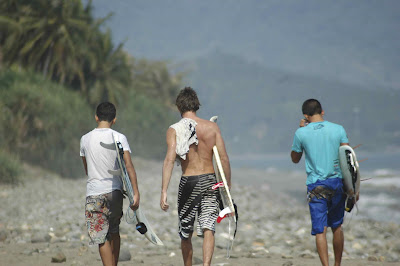
The house on the point faces one of the most consistent waves in Indonesia. Wet season, dry season, all season; it delivers endless early mornings sessions full of non-descript barrels and long, caramel-smooth bottom turns. But the wave is fractional compared to the spoils on land.
Living here, soaking in a way of life so foreign to us foreigners, is intoxicating. It’s refreshing to be reminded on a daily basis that life will and can go on if the kid’s don’t find that perfect costume for Halloween, or the washing has to be hung out on the line.
The river flows down past the house, almost as an after thought, nearly forgotten as you stare mesmerized by the pulsing ocean swells peeling mechanically down the smooth boulder-point directly in front of the shaded porch. But the river is alive.
Lizards, the size of a small surfboard, slink about on the mud-tinged banks, disappearing under water momentarily in pursuit of sustenance. Fisherman cast their nets for tiny baitfish, perforating the detergent laden water that carries 40,000 shits from villages upstream into the ocean. The floating, makeshift bamboo bridge acts as a damn, collecting meters of random rubbish; used plastic bottles, candy wrappers, pairs of unpaired sandals, and empty packets of mie goring and pop mie.
The river smells of detergent and brine, a milky-slick surface that upon repeated encounters makes you cringe. But that is Java. It’s not Disney clean or pristine and untouched. It’s millions and millions of people living on one of the most densely populated islands in the world.
It’s rice paddies terraced in a river delta. Redbrick homes with wood fired ovens inside casting a warm glow and billowing smoke into the late afternoon air. Sounds of the muezzin call most into the mosque to face Mecca and pray to Allah. “Aaaaallaaahh uuuuu aaaakkbaaar”.
It’s mango trees and pepper plantations, cloves and rubber trees dripping with latex, miles and miles of palm oil plantations where ancient stands of teak and mahogany once stood. Cacophonies of stimuli hitting you from all sides if you open you’re eyes, ears, and nose.
One of my favorite things to do here is hop on the back of a motorbike near sun down, and cruise the streets into town. The mid-day heat has passed and the towns and villages are coming back to life. Warungs selling bottles of water, packets of instant coffee, and a mystery of fried assortments line the streets. A sea of motorbikes swallows the road, often with families of five along for the ride. Dad’s usually driving, an infant pressed between him and Mom, the tail end filled out with respective siblings in order of proper decent, sometimes with cell phones out sending sms’s to the sky.
People are always everywhere. Squatting along the road, in the road, barely taking notice of the chaotic symphony that surrounds them. Smiling girls grin and giggle as you pass by, brown skinned with jet-black hair coifed with the typical shark fin inlay across the forehead.
Fireworks blast off in the distance as children race past with rice-paper kites in tow. Laughter and exhaust mix with the call to prayer, creating a patchwork of treble and bass, lacing the early evening air in full stereo surround sound.
It’s free and 100 percent pure entertainment that no reality TV show could ever hope to capture, life passing about.

